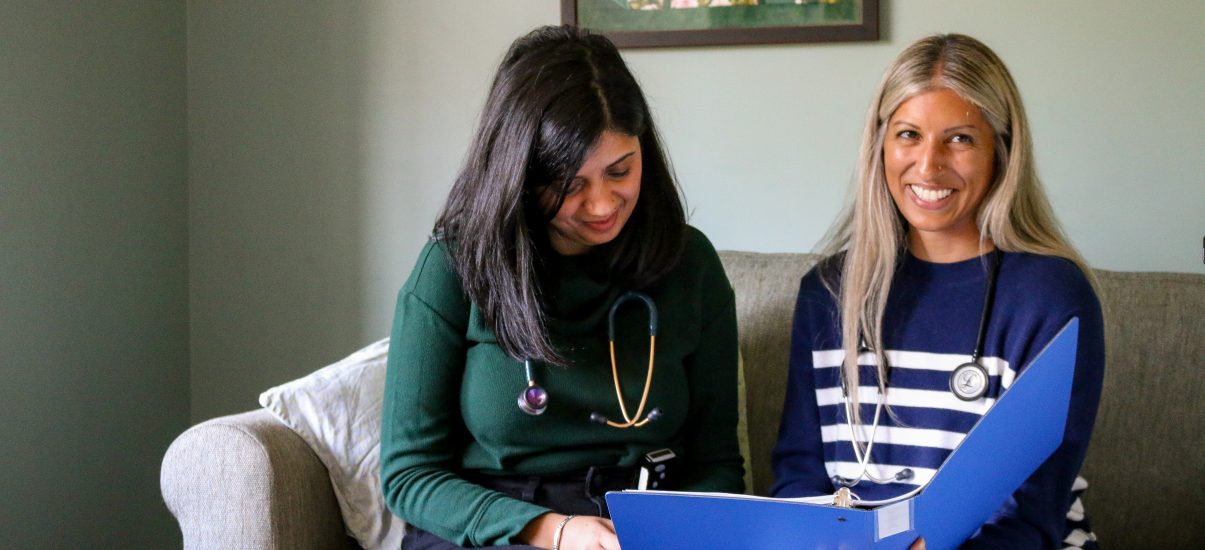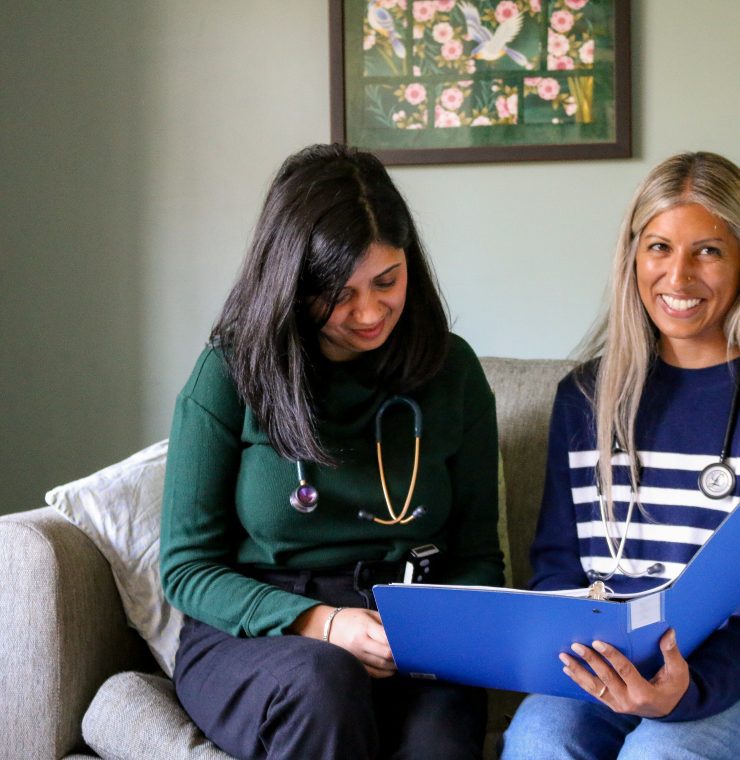

World Cancer Day: Advancing pediatric oncology through interdisciplinary collaboration
As the field of Pediatric Palliative Care (PPC) evolves, so does the collaboration between our clinical care teams and others across BC and beyond. One partnership that continues to develop is that between Canuck Place BC Children’s Hospital Oncology team. The continued interdisciplinary teamwork has seen substantial positive outcomes when it comes to quality and access to personalized care.
This World Cancer Day, we invited Canuck Place physician Dr. Natasha Datoo and Pediatric Oncologist at BC Children’s Hospital, Dr. Rod Rassekh to discuss how the growth of this care team collaboration has had positive outcomes in the pediatric oncology.

When you began your career in pediatric oncology, how did the teams work together and what was the level of collaboration between the pediatric palliative care team with your oncology patients?
Dr. Natasha Datoo: I first started my training in pediatric oncology, the oncology team and Canuck Place team worked well together and collaborated in caring for children with non-curable cancers. Some of my first interactions with the palliative care teams included the Canuck Place doctor seeing patients on the oncology ward who were imminently dying. The Canuck Place doctor would help support symptoms and emotional support for families. As an oncology fellow, we all rotate through a month of PPC, so I spent a month at Canuck Place. The teams worked well together but it was mostly in the context of supporting children who were at the terminal stages of their disease and this would mostly be supported while patients were admitted to hospital or the hospice.
What do you think is one of the most important pieces of working as an interdisciplinary team between pediatric palliative care and pediatric oncology?
Dr. Natasha Datoo: Good communication and trust. I find some of the best patient care we deliver is because the oncology team communicates with Canuck Place early on about their worries for a patient and family so we can engage collaboratively and get to know families while their child still well. Trust is also a very important because as an oncologist we know and care for these families for many years and trusting the Canuck Place team to become involved knowing they will assess and offer unique support to their patients in an individualized way.
How did the pediatric palliative care and pediatric oncology become more collaborative over time?
Dr. Natasha Datoo: I think one of the ways I have experienced increased collaboration is becoming more involved and consulted earlier in a patient’s journey. I am very lucky that as an oncologist I get to know all the oncology families and sometimes am able to identify areas that the Canuck Place team may be helpful. I have noticed in the last few years that the oncology team is using our Canuck Place resources more broadly and we are seeing a lot more patients where our supports not only include symptom management near end of life, but we are their main pain team when the child is well and at home. With our outpatient community care team, we can now collaborate earlier and engage with families in the home to provide symptom management and relationship building. I have also noticed oncology patients and families are interested in staying at the hospice for medical respite care. Previously, our oncology families would mostly only stay at the hospice for end of life care so it is really refreshing and exciting that these families are starting to see Canuck Place as more than just end of life care Being able to work in both fields allows each team a direct link to each other and makes communicating and discussing how we can collaborate a little bit easier.
What has been one of the most noticeable improvements in care since Canuck Place and BC Children’s Oncology team have become more collaborative?
Dr. Natasha Datoo: We now see all patients who will undergo an allogeneic bone marrow transplant as well as any patient who has relapsed. These are called trigger consults and I think they have improved the care of these high-risk patients. It allows the oncology team to introduce Canuck Place early on, and if these children get sicker, Canuck Place is already involved and hopefully has built relationships. Canuck Place is also able to support families in their own homes, which has improved care so families do not need to come to clinic, but rather, can be seen in their own home or even on Zoom with the oncologist and Canuck Place.

How do you and Dr. Rod work together to move the collaboration between pediatric palliative care and pediatric oncology forward?
Dr. Natasha Datoo: My role in oncology involves covering different oncologists and I often cover Dr. Rod’s patients. I think this allows families to see how closely the oncology and Canuck Place teams work together. I think it allows a gentler way to introduce the idea of the Canuck Place team to a family that may be hesitant to meet a palliative care team. Dr. Rod often will let me know about patients of his who he thinks could benefit from extra support. He introduces me as a clinician who works with both teams and invites me to join in his clinic visits or family meetings. I think Dr. Rod has a really great approach to how he collaborates with Canuck Place in that he truly trusts us. I hope, together, we can continue to push for early engagement of the Canuck Place team as I think this has a significant, positive impact on patient care. I also hope to work with Dr. Rod on engaging Canuck Place with patients who are involved in phase I/II trials, furthering holistic care for oncology patients in BC.

What are some of the benefits you’ve noticed as the collaboration between Canuck Place Children’s Hospice and BC Children’s Pediatrics Oncology teams has deepened?
Dr. Rod Rassekh: Our patients benefit when they have the support of both the pediatric oncology and the Canuck Place programs. We have complimentary skill sets and resources and can individualize plans for families. For instance, I see more care being delivered in a patient’s home community thanks to the wonderful Canuck Place outreach nurses. I have patients who spend months in hospital enjoy a medical respite stay at Canuck Place to have a change in scenery that very much helps with their mental health. I also love coming to Canuck Place to do “home visits” with my patients and see them outside of the hospital setting (a side benefit for me includes always grabbing one of those amazing Canuck Place cookies!) The biggest benefit for me personally is the amazing collaborative relationship that I have with the people working at Canuck Place— we laugh together, we cry together, and we support each other to deliver care to a group of amazing children and families who deserve the best care possible.
Why do you think it’s important to have conversations about palliative care with your oncology patients?
Dr. Rod Rassekh: When I first started here over 20 years ago, palliative care was associated only with end of life care. It often was about the child who had relapsed and who was going to stop treatment. Things have very much shifted over the years and now it is about having those discussion early with families and introduce the concept that palliative care includes symptom management right from the time of diagnosis. I discuss palliative care right at time of diagnosis now for all my high-risk cancer patients, and include Canuck Place in those early meetings with families.
The collaboration between Canuck Place and BC Children’s Hospital Oncology team exemplifies a significant advancement in interdisciplinary teamwork between pediatric oncology and pediatric palliative care. Their integrated approach, emphasizing early engagement, strong communication, and comprehensive care, including in-home support, has greatly enhanced patient and family experiences across BC and the Yukon. This partnership serves as a model for holistic and compassionate care, underscoring the importance of evolving healthcare practices to better serve patients and their families. Ensuring that every child receives the best possible care at every stage of their journey.
Thanks to this continued interdisciplinary work Canuck Place and healthcare teams across the province are able to provide quality individualized care for our Canuck Place children and families across BC and the Yukon. This work can only continue with your continued support, and for that we thank you.
You can learn more about Canuck Place care by visiting our program page. You can also support our heart-centred care by donating today.